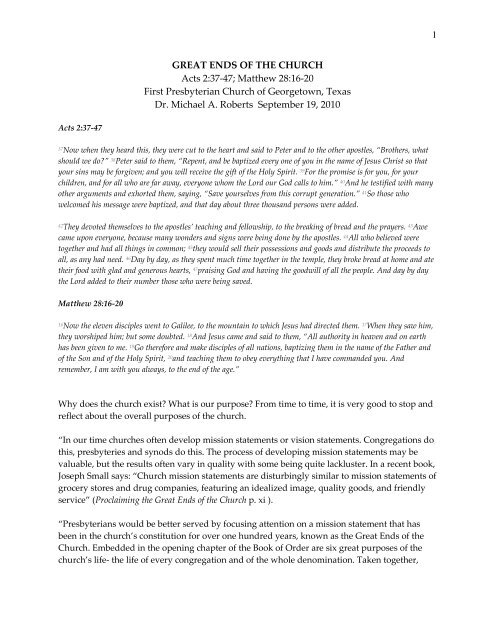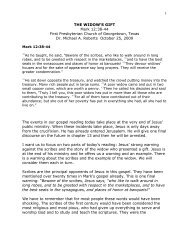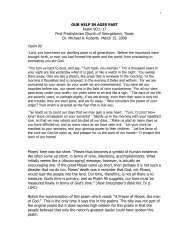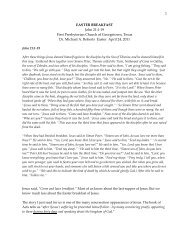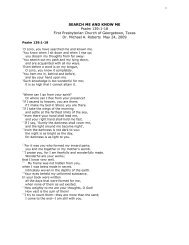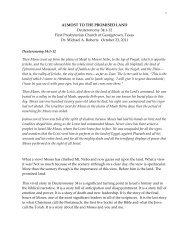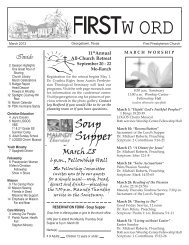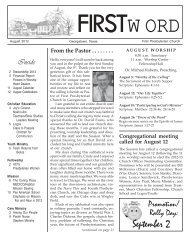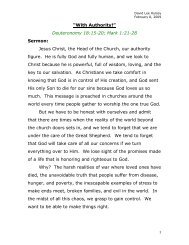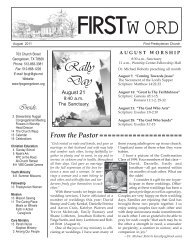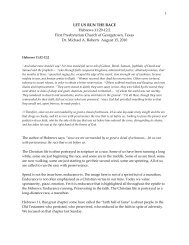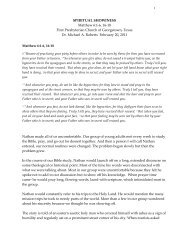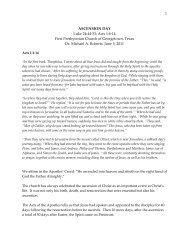1 GREAT ENDS OF THE CHURCH Acts 2:37-47; Matthew 28:16-20 ...
1 GREAT ENDS OF THE CHURCH Acts 2:37-47; Matthew 28:16-20 ...
1 GREAT ENDS OF THE CHURCH Acts 2:37-47; Matthew 28:16-20 ...
You also want an ePaper? Increase the reach of your titles
YUMPU automatically turns print PDFs into web optimized ePapers that Google loves.
1<br />
<strong>GREAT</strong> <strong>ENDS</strong> <strong>OF</strong> <strong>THE</strong> <strong>CHURCH</strong><br />
<strong>Acts</strong> 2:<strong>37</strong>-<strong>47</strong>; <strong>Matthew</strong> <strong>28</strong>:<strong>16</strong>-<strong>20</strong><br />
First Presbyterian Church of Georgetown, Texas<br />
Dr. Michael A. Roberts September 19, <strong>20</strong>10<br />
<strong>Acts</strong> 2:<strong>37</strong>-<strong>47</strong><br />
<strong>37</strong><br />
Now when they heard this, they were cut to the heart and said to Peter and to the other apostles, “Brothers, what<br />
should we do?” 38 Peter said to them, “Repent, and be baptized every one of you in the name of Jesus Christ so that<br />
your sins may be forgiven; and you will receive the gift of the Holy Spirit. 39 For the promise is for you, for your<br />
children, and for all who are far away, everyone whom the Lord our God calls to him.” 40 And he testified with many<br />
other arguments and exhorted them, saying, “Save yourselves from this corrupt generation.” 41 So those who<br />
welcomed his message were baptized, and that day about three thousand persons were added.<br />
42<br />
They devoted themselves to the apostles’ teaching and fellowship, to the breaking of bread and the prayers. 43 Awe<br />
came upon everyone, because many wonders and signs were being done by the apostles. 44 All who believed were<br />
together and had all things in common; 45 they would sell their possessions and goods and distribute the proceeds to<br />
all, as any had need. 46 Day by day, as they spent much time together in the temple, they broke bread at home and ate<br />
their food with glad and generous hearts, <strong>47</strong> praising God and having the goodwill of all the people. And day by day<br />
the Lord added to their number those who were being saved.<br />
<strong>Matthew</strong> <strong>28</strong>:<strong>16</strong>-<strong>20</strong><br />
<strong>16</strong><br />
Now the eleven disciples went to Galilee, to the mountain to which Jesus had directed them. 17 When they saw him,<br />
they worshiped him; but some doubted. 18 And Jesus came and said to them, “All authority in heaven and on earth<br />
has been given to me. 19 Go therefore and make disciples of all nations, baptizing them in the name of the Father and<br />
of the Son and of the Holy Spirit, <strong>20</strong> and teaching them to obey everything that I have commanded you. And<br />
remember, I am with you always, to the end of the age.”<br />
Why does the church exist? What is our purpose? From time to time, it is very good to stop and<br />
reflect about the overall purposes of the church.<br />
“In our time churches often develop mission statements or vision statements. Congregations do<br />
this, presbyteries and synods do this. The process of developing mission statements may be<br />
valuable, but the results often vary in quality with some being quite lackluster. In a recent book,<br />
Joseph Small says: “Church mission statements are disturbingly similar to mission statements of<br />
grocery stores and drug companies, featuring an idealized image, quality goods, and friendly<br />
service” (Proclaiming the Great Ends of the Church p. xi ).<br />
“Presbyterians would be better served by focusing attention on a mission statement that has<br />
been in the church’s constitution for over one hundred years, known as the Great Ends of the<br />
Church. Embedded in the opening chapter of the Book of Order are six great purposes of the<br />
church’s life- the life of every congregation and of the whole denomination. Taken together,
2<br />
they express direction for mission with a clarity and substance rarely found in the fleeting<br />
products of church committees” (Proclaiming the Great Ends of the Church p. xi ).<br />
“The great ends of the church are the proclamation of the gospel for the salvation of humankind;<br />
the shelter, nurture, and spiritual fellowship of the children of God;<br />
the maintenance of divine worship;<br />
the preservation of the truth;<br />
the promotion of social righteousness;<br />
and the exhibition of the Kingdom of heaven to the world” (Book of Order G-1.0<strong>20</strong>0).<br />
“With an economy of words and a surplus in meaning, the church has six great aims to direct<br />
our life together, six basic works of the church that are foundational to who the church is and<br />
what the church is called to do” (Proclaiming the Great Ends of the Church p. xi ).<br />
The Great Ends of the Church were originally a part of the constitution of a smaller Presbyterian<br />
body, the United Presbyterian Church of North America when it was first adopted in 1910. It<br />
became a gift to the union of the northern Presbyterians in 1958 and later to all Presbyterians<br />
when the northern and southern branches of the Presbyterian Church reunited in 1983.<br />
The Great Ends have received greater emphasis in our denomination in the past 15 years or so.<br />
Without a clear vision of the future, local congregations and national denominations will find<br />
themselves in difficult waters. It is no secret that our historic denomination is searching for a<br />
center, roaming around for an identity that will serve us in the coming decades. There are many<br />
who think that center, the unifying vision of our identity and mission is found in the Great Ends<br />
of the Church.<br />
The General Assembly of 1997 called on all Presbyterians to find a new unity and sense of<br />
purpose in the Great Ends with a special two-year emphasis upon them. The assembly said: “It<br />
sometimes seems that we get caught up in the details of our work, telling the story of how well<br />
we have carried out our responsibilities and lose sight of why we are doing what we do. These<br />
principles help us refocus on Jesus as the reason for our mission… It is the fervent prayer of the<br />
General Assembly that we indeed might be one in our commitment to proclaim the Gospel, to<br />
build community, to worship, to seek the truth, to promote social justice, and to live our lives in<br />
such a way as to exhibit God’s love to the world.” We did emphasize the Great Ends in 1998<br />
and 1999 throughout our denomination.<br />
Since that time there has been a curriculum developed on the Great Ends. There are banner<br />
designs developed for each of the great ends. Our denomination has published a six volume<br />
series of books on the Great Ends. One of the authors is well-known to our congregation, Dr.<br />
Cindy Rigby, who has written the volume on the Promotion of Social Righteousness.
3<br />
Former Stated Clerk Clifton Kirkpatrick has called the Great Ends “a beautiful and succinct<br />
vision” for the church. For 100 years now, this vision has guided the ministry and mission of<br />
Presbyterians.<br />
Let’s look at the Great Ends of the Church this morning.<br />
“The great ends of the church are the proclamation of the gospel for the salvation of<br />
humankind.” This purpose is what the church has historically called “evangelism”, the<br />
proclamation of the evangel, the good news about Jesus Christ. God was revealed to us in the<br />
person of Jesus. He taught and healed the people, he died sacrificially for the sins of the world,<br />
and he rose victoriously, conquering sin and death. Our salvation comes when we place our<br />
trust in what Jesus Christ has done for us.<br />
The church is called to proclaim this gospel to all the world. We are to make disciples of all<br />
nations. We are called to clearly articulate this gospel and all its dimensions from the pulpit. We<br />
are called to learn and understand the good news through our diverse education ministries. We<br />
are called to give witness to others when called upon- to explain what we believe and how God<br />
has worked in our lives.<br />
This Great End has driven the worldwide mission of the church- all need to hear the good news<br />
explained clearly and persuasively. In the last generation, Presbyterians have struggled with<br />
this Great End. They have been reticent to share their faith. Some churches have been timid<br />
about communicating the central message of the New Testament. Some presbyteries (not ours<br />
by the way) have been slow in developing new congregations so that new people can hear the<br />
proclamation. We freely, openly, I think thoughtfully proclaim the gospel for the salvation of<br />
humankind.<br />
“The shelter, nurture, and spiritual fellowship of the children of God”. The church is to be a safe<br />
place. This place is to be shelter, a safe haven both literally and symbolically. The church is to be<br />
a place where we can be ourselves, where we can be loved and nurtured.<br />
That nurture takes many forms. Certainly it includes Sunday School, small groups for adults,<br />
youth ministry, Logos. The nurture includes our care ministry, Stephen Ministry, visiting,<br />
delivering flowers, or providing meals. We find ourselves nurtured when we engage with other<br />
members, when we, as the early church did, devote ourselves to the fellowship.<br />
Fellowship literally refers to “what we share in common.” We share a common faith, a common<br />
Bible, a common Savior. We share our resources with each other, we offer our gifts, our time to<br />
serve one another. We have devotion to the spiritual fellowship of the children of God.<br />
The church will provide a place where we can get to know other Christians, share life’s ups and<br />
downs together, bear one another’s burdens, and love each other.
4<br />
As Jesus said (and as the children sang): “By this everyone will know that you are my disciples, if you<br />
love one another" (John 13:35). One of the Great Ends of the church is the shelter, nurture, and<br />
spiritual fellowship of the children of God.<br />
Another is “the maintenance of divine worship.” Maintenance is certainly a 1910 word. Not<br />
many would refer to worship today using the word maintenance. We would say the spirit of<br />
divine worship, the excitement of divine worship, the uplifting of divine worship.<br />
But there is something to be said for being in God’s presence continually, regularly, consistently<br />
week after week and year after year. Worship has been held every Sunday in the Christian<br />
church for the last 2,000 years. Our congregation has maintained the worship of the living God<br />
for 156 years now. Sunday after Sunday we have worshipped in the Sanctuary 1<strong>37</strong> years and in<br />
the Worship Center in the Fellowship Hall for <strong>16</strong> years now.<br />
Worship takes many forms in the church, even in one denomination like ours. There are<br />
churches which have traditional services and others more contemporary and some which seek<br />
to blend styles. Some churches are more informal and some more formal. The variety of music<br />
available to the church has never been greater.<br />
Our Presbyterian Book of Common Worship lifts up the importance of worship this way:<br />
“Worship is at the very heart of the church’s life. All that the church is and does is rooted in its<br />
worship. The community of faith, gathered in response to God’s call, is formed in its worship.<br />
Worship is the principal influence that shapes our faith, and is the most visible way we express<br />
the faith.”<br />
Our constitution adds: “Christian worship joyfully ascribes all praise and honor, glory and<br />
power to the triune God. In worship the people of God acknowledge God present in the world<br />
and in their lives. As they respond to God’s claim and redemptive action in Jesus Christ,<br />
believers are transformed and renewed. In worship the faithful offer themselves to God and are<br />
equipped for God’s service in the world” (Book of Order W-1.1000).<br />
That is worth maintaining. There are many, many people involved in preparing and leading our<br />
worship. A significant portion of our time and attention goes into maintaining divine worship.<br />
Next up: “The preservation of the truth”. Truth has taken quite a hit in recent years. Nowadays,<br />
truth is perceived as relative, depending upon your perspective. I would say that we don’t<br />
always know the truth but the task of the church is that we pursue the truth, we seek to discern<br />
the truth, and then to live out the implications of the truth.<br />
Jesus, of course, claimed to be the truth. And Jesus affirmed that God’s word is truth. We read<br />
and study scripture to ascertain the truth for our lives and the world. Teachers and preachers in<br />
the church are encouraged by the words in 2 Timothy: “proclaim the message; be persistent whether<br />
the time is favorable or unfavorable; convince, rebuke, and encourage, with the utmost patience in
5<br />
teaching. For the time is coming when people…will turn away from listening to the truth and wander<br />
away to myths.”<br />
We Presbyterians have also been huge advocates of education because we are pursuing and<br />
preserving the truth. We preserve the truth when we tell our history accurately; when decisionmaking<br />
is open, fair, and honest; when we seek the truth in our relationships; when we speak<br />
the truth to each other in love.<br />
Another of the Great Ends of the Church is: “the promotion of social righteousness”.<br />
Righteousness is a biblical term often used in our relationship with God. Righteousness is<br />
having a “right relationship” with God- healthy, harmonious, fulfilling, peaceful.<br />
Social righteousness refers then to having right relationships with other human beings- healthy,<br />
harmonious, fulfilling. We treat our fellow humans with respect, with equality, with peace.<br />
Anybody who has studied the history of the church or society, or hears the evening news for<br />
that matter knows that this has not always been the case. Our relationship with God though<br />
should issue forth in changed relationships with people.<br />
This linking is explained well in 2 Corinthians 5: “All this is from God, who reconciled us to himself<br />
through Christ, and has given us the ministry of reconciliation; that is, in Christ God was reconciling the<br />
world to himself, not counting their trespasses against them, and entrusting the message of reconciliation<br />
to us.”<br />
Reconciliation is not only what God has done for us in Christ. Reconciliation is also the mission<br />
of the church. We have been reconciled to be reconcilers. We have been reconciled to God in<br />
order that we might be reconcilers in our lives and in the world. God has given to us, to you<br />
and me, the message and ministry of reconciliation. We are to be about mending the<br />
brokenness of our world.<br />
One of our confessions, the Confession of 1967 states: “God's reconciling work in Jesus Christ<br />
and the mission of reconciliation to which the church has been called are the heart of the gospel<br />
in any age. Our generation stands in peculiar need of reconciliation in Christ.”<br />
When Presbyterians wrote the Confession of 1967, 43 years ago, they addressed four<br />
particularly urgent needs of reconciliation in the world: 1) breaking down racial barriers 2) the<br />
reconciliation of nation to nation instead of war. 3) the reconciliation between the rich and poor<br />
in our world. 4) reconciliation between women and men.<br />
Notice in this Great End we not only practice social righteousness. We promote it. We lift it up,<br />
we say this is what we stand for, this is who we are as the people of God.<br />
Last Great End-“the exhibition of the Kingdom of heaven to the world.” The kingdom of<br />
heaven is a common expression of Jesus in the Gospel of <strong>Matthew</strong>. The other gospels tend to
6<br />
use kingdom of God. In introducing his parables he will say the kingdom of Heaven is like “a<br />
mustard seed” or “like yeast” or “like a treasure hidden in a field” (<strong>Matthew</strong> 13:31, 33, 44). Jesus<br />
also teaches us to pray “thy kingdom come.”<br />
For Jesus, the kingdom was not a physical reality. He was not interested in conquering another<br />
people, of freeing the Jews from the Romans. The kingdom of God is not a geographical<br />
territory. The kingdom is the dominion of God over God's people. The kingdom of heaven is the<br />
rule of God over human lives. How does the kingdom come? By us being open to the rule of<br />
God in our lives.<br />
There will be a time in the future when God’s reign will be complete and full. It is only partial<br />
now. But whenever a person allows God to be Lord of their life, then God’s kingdom has come.<br />
And when an ever-growing group of people allow God to reign over their lives, God’s kingdom<br />
grows.<br />
When God’s reign is present in our lives, we will be different people. We will be people of love,<br />
compassion, and forgiveness. We will be people with perspective, pursuing the truth, and<br />
seeking to serve others. What the church is intended to do then is exhibit the kingdom, God’s<br />
reign to the world. We are to live in such a way that people notice and they see God’s presence<br />
in our lives.<br />
Another part of our constitution puts it this way: “The Church of Jesus Christ is the provisional<br />
demonstration of what God intends for all of humanity. The Church is called to be a sign in and<br />
for the world of the new reality which God has made available for people in Jesus Christ…The<br />
Church is called to undertake this mission even at the risk of losing its life, trusting in God alone<br />
as the author and giver of life, sharing the gospel, and doing those deeds in the world that point<br />
beyond themselves to the new reality in Christ” (Book of Order G-3.000 ).<br />
This is not easy. But then none of the Great Ends are easy. Don’t ever think that we are about<br />
little things. We are called by God to these large, overarching, significant purposes.<br />
The Great Ends provide a hundred year old vision of the church’s ministry and mission. These<br />
words still provide a centering vision for the church today. The Great Ends sketch out what a<br />
healthy, vibrant congregation looks like. I believe that our congregation with God’s grace seeks<br />
to live out those purposes. And I believe that those Great Ends will continue to guide our<br />
ministry in the years to come.<br />
“The great ends of the church are the proclamation of the gospel for the salvation of humankind;<br />
the shelter, nurture, and spiritual fellowship of the children of God;<br />
the maintenance of divine worship;<br />
the preservation of the truth;<br />
the promotion of social righteousness;<br />
and the exhibition of the Kingdom of heaven to the world” (Book of Order G-1.0<strong>20</strong>0).


